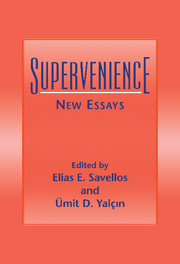Book contents
- Frontmatter
- Contents
- List of Contributors
- Introduction
- Varieties of Supervenience
- Supervenience: Model Theory of Metaphysics?
- “Global” Supervenient Determination: Too Permissive?
- Weak Supervenience Supervenes
- The Tweedledum and Tweedledee of Supervenience
- Reduction in the Mind of God
- Psychophysical Supervenience, Dependency, and Reduction
- Supervenience Redux
- Nonreducible Supervenient Causation
- Physicalism, Supervenience, and Dependence
- An Argument for Strong Supervenience
- Arguments for Supervenience and Physical Realization
- Supervenience and the Essences of Events
- How Does Ontology Supervene on What There Is?
- Supervenience and Intentionality
- Supervenience, Coherence, and Trustworthiness
- Does Truth Supervene on Evidence?
- Index
The Tweedledum and Tweedledee of Supervenience
Published online by Cambridge University Press: 29 March 2010
- Frontmatter
- Contents
- List of Contributors
- Introduction
- Varieties of Supervenience
- Supervenience: Model Theory of Metaphysics?
- “Global” Supervenient Determination: Too Permissive?
- Weak Supervenience Supervenes
- The Tweedledum and Tweedledee of Supervenience
- Reduction in the Mind of God
- Psychophysical Supervenience, Dependency, and Reduction
- Supervenience Redux
- Nonreducible Supervenient Causation
- Physicalism, Supervenience, and Dependence
- An Argument for Strong Supervenience
- Arguments for Supervenience and Physical Realization
- Supervenience and the Essences of Events
- How Does Ontology Supervene on What There Is?
- Supervenience and Intentionality
- Supervenience, Coherence, and Trustworthiness
- Does Truth Supervene on Evidence?
- Index
Summary
A growing number of philosophers have turned to supervenience in hopes of finding a nonreductive form of determination. The search, however, is complicated by the fact that there is an entire family of supervenience relations, not all of which have the same reductive and determinative capacities. Among these various relations, two have come to receive a considerable amount of attention and interest, namely, strong supervenience and global supervenience.
Strong supervenience is a relation that holds between sets of properties and the individual objects that exemplify these properties. In particular, for two sets of properties A and B:
(SS)A strongly supervenes on B just in case, necessarily, for each object x and each property F in A, if x has F, then there is a property G in B such that x has G, and necessarily if any object y has G, it has F.
In contrast to strong supervenience, global supervenience is a holistic relation that applies to entire worlds rather than individual objects:
(GS)A globally supervenes on B just in case worlds that are indiscernible with regard to B are also indiscernible with regard to A.
Some philosophers prefer global supervenience over strong, arguing that although strong supervenience might be strong enough to function as a relation of determination, it is not weak enough to be nonreductive. Others prefer strong supervenience over global, arguing that although global supervenience might be weak enough to be nonreductive, it is not strong enough to serve as a relation of determination.
- Type
- Chapter
- Information
- SupervenienceNew Essays, pp. 110 - 123Publisher: Cambridge University PressPrint publication year: 1995



